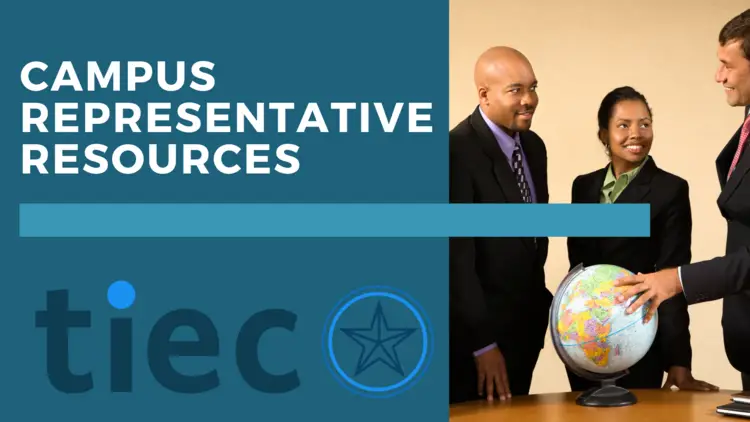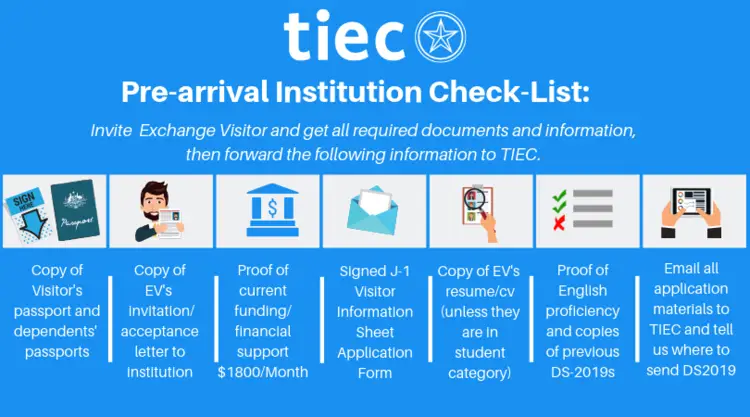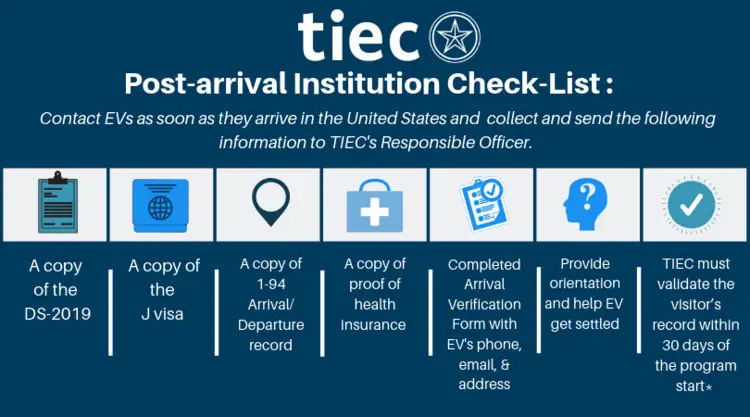Resources for Campus Reps
Information for your Campus

Process:

*Exchange visitors may enter the U.S. on their J visa within 30 days before or after their program start date. However, TIEC strongly recommends that exchange visitor arrive no later than 2 weeks after the program start date. If the exchange visitor is unable to enter the U.S. in time, inform TIEC so we can amend the exchange visitor’s DS-2019 by deferring the start date and issuing a revised DS-2019, which has to be mailed to the exchange visitor.
Pre-Arrival Information
Designated Campus Representatives or inviting faculty members should provide the following information to exchange visitors prior to arrival.
A description of the program in which the exchange visitor is participating;
Rules that the exchange visitor is expected to follow under the program
Fees EV will need to pay
Estimated monthly living expenses in your city
Help and resources available to the EV, both at university and in the city
Communicating with Exchange Visitors
If the visitor’s entry is delayed by more than 2 weeks, please contact us so that we may produce a new DS-2019 with a later start date.
Post-Arrival Check-in
Upon arrival, the visitor will report to your office to check in, give you copies of important paperwork to forward to us, and receive a basic orientation from your office, similar to that you provide to other international visitors. Visitors will likely need assistance securing housing and health insurance, and may require help getting a social security number. The most important duty of our on-campus representative during this time is to ensure that visitors fill out the required arrival forms providing TIEC with proof of insurance, emergency contact, and current US address, which you must send to us no later than 25 days after their entry so that our office can validate program participation in SEVIS.

*Failure to validate the exchange visitor’s record within 30 days of the listed SEVIS start date will result in automatic cancellation of the record.
Orientation
All exchange visitors and any accompanying family members (spouse and/or unmarried, minor children) must be provided information to assist them in settling into the local community. Orientation must include, but is not limited to:
Read about a wide variety of exchange visitor experiences
Local community resources
Public transportation
Medical centers
Schools
Libraries
Recreation centers
Banks
During Exchange Visitor’s Program
Designated Campus Representatives help coordinate and/or report the following services during an EV’s program.
Visa Extension: Submit extension requests to TIEC at least one month before the end date of the current DS-2019. There are no extensions for the Short-Term Scholar category.
Changes in site location or EV’s residential address, phone number, email address, etc.
Leaving the Country (temporarily): TIEC RO or ARO must sign the EV’s DS-2019 allowing them to travel outside of the U.S. and return. Submit in writing the anticipated departure and return dates as well as the purpose of travel. Special permission will be needed if the time outside the country is more than 30 days, and there are additional regulations for 30+ days of travel outside the U.S. specific to Professors and Research Scholars. J-2 dependents cannot stay in the U.S. with the J-1 holder absent.
Leaving the Country (permanently): Notify TIEC immediately if the exchange visitor or any of his or her dependents leave the U.S. permanently before the program end date on the exchange visitor’s DS-2019.
Transferring Out: Exchange visitors may transfer to another school to continue their program as long as they have time remaining on their category and the new program is in line with the original purpose of their program. Please complete the transfer out form and send to us, as TIEC will need to coordinate with the new program sponsor to approve the transfer.
Program Completion: Inform TIEC when visitors complete their program and leave the U.S.
Breach of program compliance, including failure to maintain health insurance coverage for any period. Sponsors must terminate an exchange visitor’s participation in their program if it is determined that:
the exchange visitor or any of their dependents willfully fails to remain in compliance with minimum requirements for health insurance coverage (22 CFR 62.14). The period of required coverage is the actual duration of the exchange visitor’s participation of the program as recorded on the DS-2019 in the “program begin date” and “program end date”.
the exchange visitor is engaged in unauthorized employment (22 CFR 62.40).
the exchange visitor fails to pursue the activities for which they were admitted to the U.S.
A significant change in funding.
Request to change the exchange visitor’s program category. A change of the exchange visitor’s program category requires a direct appeal to the U.S. Department of State and includes a nonrefundable fee of $367 payable to the U.S. Department of State. If the request is denied, the participant is expected to return home no later than 30 days from the date of the Department’s notice or the program’s end date indicated on the Form DS-2019, whichever is later. TIEC recommends that the exchange visitor talk with an immigration specialist first.
Request to change the exchange visitor’s visa status. A change of the exchange visitor’s visa status requires a direct appeal to U.S. Citizenship and Immigration Services. Once the request is submitted, the exchange visitor cannot extend their program and may also face other restrictions until their request is resolved. TIEC recommends that the exchange visitor talk with an immigration specialist first.
Changes in biographic information (name, gender, country of citizenship, etc.).
Lost or damaged DS-2019 form. TIEC will send a replacement.
Annual Reporting
Once a year, the U.S. State Department asks all J-Visa sponsors to complete a comprehensive report of their program, participants, and highlights. TIEC relies on our Campus Representatives to compile this report for their universities and forward them to us for submission. We collate reports from our universities and must submit the report in July of each year. This means that in June, TIEC will ask you to begin collecting the data needed, write your report, and send it to us by early July.
Links to Exchange Visitor Program Forms
Automated DocuSign version:
DS-7002 Form (Student Internship Placement)
PDF version (printable and form-fillable):
DS-7002 Form (Student Internship Placement)
TIEC is honored to provide J visa services to your campus.
In general, TIEC’s J visa services include issuing immigration documents for exchange visitors and their dependents, maintaining the J visa exchange visitors’ records, amending program information, authorizing employment, extending their program within the regulations, transferring, requesting reinstatement, and conducting any other procedures necessary.
Effective July 1, 2022, TIEC charges the following fees for the program:
-
$545 for new applications, including transfer-in exchange visitors, plus $100 per additional dependent
-
$250 each year beyond initial 15 months
-
$150 expedited processing fees, including new / transfer-in applications sent within 45 days of the program start date, arrival verification or request to push back start date sent 15+ days after program start date on current DS-2019
-
$60 of expedited shipping (via FedEx)
-
Cost of Special Circumstances fees and charges, including extensions beyond maximum duration, change of category, reinstatement
These fees are separate from those payable directly to the U.S. government (such as SEVIS I-901 Fee and J-1 visa fee).
TIEC usually sends an invoice to an official to whom the visitor will be responsible at the educational institution. However, the fee should be paid prior to issuance of the DS-2019 by check, money order, or credit card. TIEC can usually process DS-2019s and mail them to the educational institution within one week of receipt of all required information.
TIEC relies on selected Designated Campus Representatives as primary points of contact for help in administering our J visa program. Designated Campus Representatives help bridge the communications pathway on their campuses between inviting faculty members, exchange visitors, and other contact people; ensure compliance of the Exchange Visitor Program on their respective campuses; and relay important information between the exchange visitors and TIEC as well.
1- Inviting exchange visitors, compiling and submitting application materials
Designated Campus Representatives work with inviting faculty members to compile a complete an application packet, which is forwarded to our office for processing.
2- Applying for DS-2019s
When you are ready to apply for a DS-2019 for a new exchange visitor, you should begin gathering the required application materials, which usually include the following:
(1) TIEC J-1 Exchange Visitor Information Sheet (New Application). Information on this form will be used to create the DS-2019 form for the exchange visitor, which in turn allows them to apply for their J visa.
(2) Invitation letter from your institution, on your institution’s letterhead, addressed to the prospective EV from the inviting department and includes:
(A) the description of the program, research, work, or field of study;
(B) the description of costs likely to be incurred by the visitor in the U.S. (e.g., housing, transportation, health insurance);
(C) the program start and end dates; and
(D) the total amount and source of funding, if your institution financially sponsors or pays the visitor. The original letter should be mailed to the scholar/student as it will be required for a visa application.
(3) Proof of funding / financial support, , which may include letters from funding institutions (signed and on letterhead), personal bank statements of the exchange visitor, etc. TIEC strongly recommends that the funding equals at least $1,800 a month plus an additional $500 per additional dependent per month. Exchange visitors in the student category have additional regulations, detailed here.
(4) Proof of English proficiency, which indicates that the exchange visitor possesses sufficient proficiency in the English language to successfully participate in his or her program and to function on a day-to-day basis. Submit to TIEC at least one of the following:
(A) Adequate scores on English proficiency tests such as IBT TOEFL, IELTS, and TOEIC, or scores on other standardized tests in English such as GRE and GMAT.
(B) A letter signed by the direct supervisor of the exchange visitor and approved by the designated campus representative which confirms 1) that interview(s) with the exchange visitor by faculty at the sponsoring institution determined that the exchange visitor has sufficient English proficiency, and 2) that the interview was conducted either in-person, videoconferencing, or by telephone if videoconferencing was not a viable option.
(C) Signed documentation from an academic institution or English language school.
(5) Copy of passport/s. Submit the passport of the exchange visitor and any accompanying dependents. The validity of the passport should last at least 6 months beyond the end of the exchange program.
(6) Copy of exchange visitor’s CV. The CV should reflect the exchange visitor’s qualifications for the field of research/work/field of study of their program.
(7) Offer letter of employment (if applicable). According to CFR Title 22, “An exchange visitor who engages in unauthorized employment shall be deemed to be in violation of his or her program status and is subject to termination as a participant in an exchange visitor program.” This may act as the invitation letter if it includes all the information required by the invitation letter. The offer letter itself should include the exchange visitor’s hours, start and end dates of employment, job responsibilities, address of site if different from the university campus, and salary. Additional regulations are applicable to students seeking employment. Additionally, the hosting institution must confirm that the employment:
(A) is under the supervision of the hosting university;
(B) is directly related to the objectives of the exchange visitor program; and
(C) is incidental to the primary program activities.
(8) For transfer-in exchange visitors, the following documents must also be submitted in addition to the above: for the exchange visitor and any dependents if they are already in the U.S. as a J visitor:
(A) TIEC’s transfer-in form
(B) Copy of passport/s. Submit the passport of the exchange visitor and any accompanying dependents.
(C) Copy of signed DS-2019/s. Submit the DS-2019 form of the exchange visitor and any accompanying dependents.
(D) Copy of I-94 form/s. Submit the I-94 form of the exchange visitor and any accompanying dependents.
*Additional supporting documents or forms may be required.
We will review the documents and contact you if we have questions. Please email j1@tiec.org if you have any questions or additional information.

• Available health care and emergency assistance
These will vary by location, so please prepare your own list of community resources. It is likely that your university already provides this information to incoming international students.
Medical insurance is a requirement for all EVs and a copy of coverage should be sent to TIEC. Acceptable insurance policies must include the following coverage.
REQUIRED MINIMUM INSURANCE COVERAGE
Major Medical Coverage $100,000
Medical Evacuation $50,000
Repatriation of Remains $25,000
Maximum Deductible per $500
Accident/illness
MINIMUM POLICY RATING (Must Comply With One)
A.M. Best rating of “A-” or above;
McGraw Hill Financial / Standard and Poor’s Claims-Paying Ability rating of “A-” or above
Weiss Research, Inc. rating of “B+” or above
Fitch Ratings, Inc. rating of “B+” or above
Moody’s Investor Services of “A3” or above
**All policies must fully comply with the Patient Protection and Affordable Care Act**
